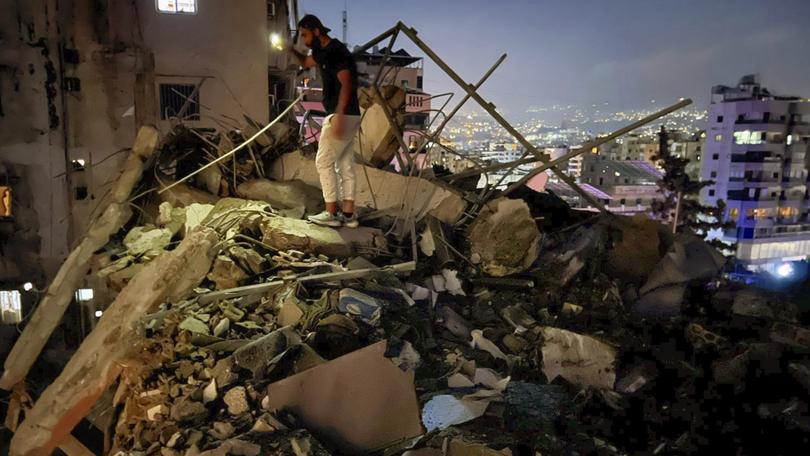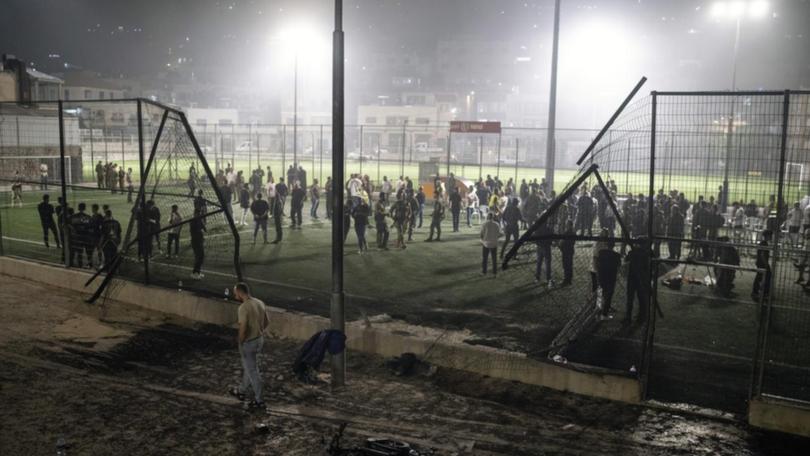What is happening in Lebanon: Israel strikes Beirut, Hezbollah commander ‘killed’, travel warnings, a new war?
The frenzy of information and warnings sparked by Israel’s strike against Beirut has sparked many anxious questions. Here’s what we know about the unravelling crisis.

Just after sunset on Tuesday in Lebanon, an Israeli airstrike hit a densely-populated populated area of the capital of Beirut.
The strike killed at least three people — including two children — and injured 74 others when it hit a block of flats in Haret Hreik, a densely populated suburb in Beirut known as a stronghold for Hezbollah, an Iranian-backed militant group.
Lebanon’s caretaker Prime Minister Najib Mikati condemned the attack as a “criminal act”.
Sign up to The Nightly's newsletters.
Get the first look at the digital newspaper, curated daily stories and breaking headlines delivered to your inbox.
By continuing you agree to our Terms and Privacy Policy.“The Israeli killing machine has not been satisfied by targeting the south of Lebanon and the Bekaa, it has now reached the heart of the capital Beirut, just meters away from one of the largest hospitals in Lebanon,” he said in a statement, the Guardian reports.
For those watching the escalating crisis in the Middle East unravel from the safety of their screens, the frenzy of information and warnings sparked many anxious questions. Here’s what we know about the unravelling crisis.
Why did Israel strike Beirut?
While it may seem random to those of us well outside the Middle East conflict, Lebanon had been expecting an Israeli strike.
The hit on Beirut was in retaliation to an airstrike from Lebanon on a village in Israeli-occupied Golan Heights at the weekend.
On Saturday, local time, a rocket struck a soccer pitch in the village of Majdal Shams, killing at least 12 people — children and teenagers all aged between 10 and 20 years old — and injuring more than 20 others, according to Israeli emergency services.
It was the deadliest attack in Israel or occupied territory since Hamas’ October 7 attack that sparked the war in Gaza.

Israel’s military said the rocket was fired by the Lebanese militant group Hezbollah, and Defence Minister Yoav Gallant said Israel would ensure “Hezbollah, the proxy of Iran, pays a price for this loss”.
Hezbollah denies the claims, saying in a statement: “The Islamic Resistance has absolutely nothing to do with the incident, and categorically denies all false allegations in this regard.”
Who was Israel aiming for?
Israel claims it killed top Hezbollah commander Fouad Shukr in the Beirut strike.
In a statement, the Israeli military said Shukr, also known as al-Hajj Mohsin, was Hezbollah’s most “senior military commander” and the right-hand man to Hezbollah leader Hassan Nasrallah.
The statement said Shukr was Nasrallah’s “adviser for planning and directing wartime operation,” directing attacks against Israel during the war in Gaza, the Washington Post reports.
“He was also responsible for the majority of Hezbollah’s most advanced weaponry, including precise-guided missiles, cruise missiles, anti-ship missiles, long-range rockets and UAVs,” the IDF said in a statement to X (formerly Twitter).
“He has been responsible for masterminding, planning and executing every Hezbollah attack,” the IDF added. “He has the blood of civilians from all over the world on his hands.”
The US had a $5 million bounty on Shukr, the IDF said, who was accused of playing “a central role” in the 1983 bombing of the US Marine Corps Barracks in Beirut, which killed 241 US military personnel.
What are the travel warnings?
Australia is among about a dozen nations warning citizens to cancel travel to Lebanon, citing the “volatile security situation and the risk of the security situation deteriorating further”.
In the wake of Tuesday’s airstrike, the government’s Smart Traveller site urged Australian citizens in Lebanon to “leave immediately while commercial flights remain available”.
“Some airlines have postponed or cancelled some flights. Further flight cancellations and disruptions could occur with little or no notice,” the statement said. Smart Traveller first changed its travel advice on Lebanon to “do not travel” on October 19.
With the risk of Beirut-Rafic Hariri International Airport — Lebanon’s only airport — closing, Australian Prime Minister Anthony Albanese echoed Smart Traveller’s warnings that the government may not be able to help citizens who leave too late.
Can people still fly out of Lebanon?
Airlines have already begun cancelling flights in and out of Lebanon’s one and only commercial airfield.
Some airlines have not been flying to the country since the start of July due to “developments” in the Middle East.
Beirut-Rafic Hariri International Airport has been targeted before in civil wars and cross-border stoushes with Israel, including the last war between Hezbollah and Israel in 2006.
Turkish Airlines cancelled two flights on Sunday, local time. Its subsidiary AJet and Turkey-based budget carriers SunExpress and Pegasus Airlines, as well as Greek carrier Aegean Airlines, Jordan carrier Royal Jordanian, Ethiopian Air, and MEA have also cancelled flights since the attack, according to flight tracking website Flightradar24.
Air France said it would suspend flights on July 29 and 30 due to the security “situation”.
Airlines under the Lufthansa Group, including Germany’s Lufthansa, Swiss and Eurowingssuspended flights to and from Beirut until August 5.
Does this mean war?
A key, anxious question arose from those watching the rubble and aftermath of this latest airstrike in the Middle East unfold from the comfort of their homes: Does this mean war?
Lebanese foreign minister Abdallah Bou Habib told the Guardian that his country wants “this cycle of destruction of killing and death to stop”.
Mr Habib said the strike was a shock to his country after Israel’s allies assured Lebanon that the Jewish state was planning a “limited response” that “would not produce a war”.
“We did not expect to be hit in Beirut. We thought these were red lines that the Israelis would respect,” he added.
According to the outlet, Lebanon plans to file a complaint with the UN Security Council after the strike and will ask Hezbollah “to have a proportional retaliation” to avoid further all-out war.
Reuters reports that the US is leading desperate diplomatic efforts to quell the spiralling unrest and deter Israel from striking major civil infrastructure in Beirut in further retaliation for the weekend’s Golan Heights attack. US Secretary of State Antony Blinken has publicly called for calm in the region.
After Israel’s retaliation, the UN peacekeeping force for the Blue Line — the demarcation between Israel and Lebanon — called for both sides to exercise “maximum restraint” and to cease fire across the border.
The assassination of Hamas leader Ismail Haniyeh in Iran — reported by Iranian state television early on Wednesday, local time — adds doubt adds to the growing tension in the besieged Middle East.
A statement issued by the Palestinian militant group mourned the death of Haniyeh, saying he was killed in “a treacherous Zionist raid on his residence in Tehran”. Senior Hamas official Moussa Abu Marzook vowed the “cowardly act... will not go unanswered”.
While no one immediately claimed responsibility for the assassination, suspicion immediately fell on Israel, which has vowed to kill Haniyeh and other leaders of Hamas over the group’s October 7 attack on Israel in the past.
Israel refused to comment on Haniyeh’s death. The Israel Defense Forces declined to comment on the incident.
But US Defence Secretary Lloyd Austin told reporters in the Phillippines on Wednesday he did not think a wider war war was now “inevitable” in the Middle East.
“I think there’s always room and opportunities for diplomacy,” he said, Washington Post reports.
“We’re [the US] going to do everything we can to make sure that we keep things from turning into a broader conflict throughout the region.”
